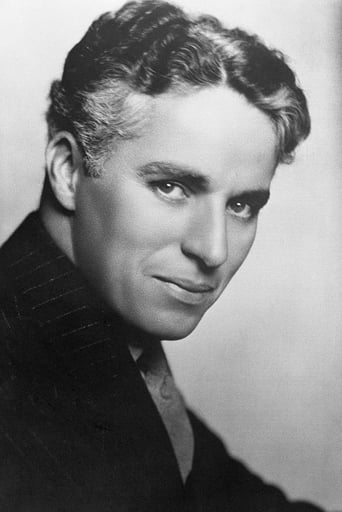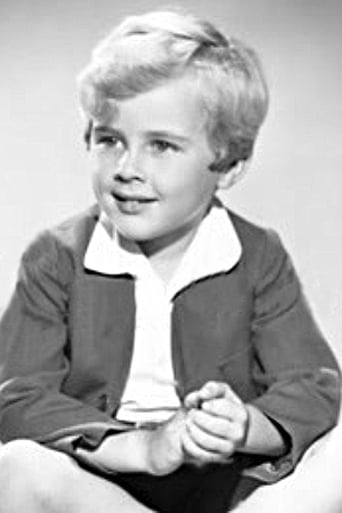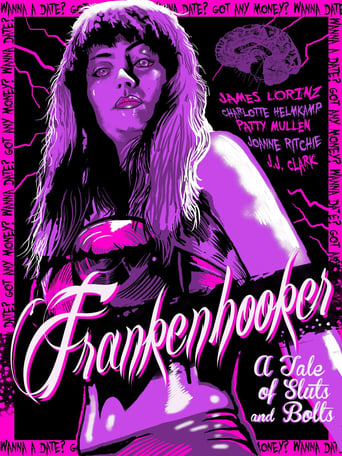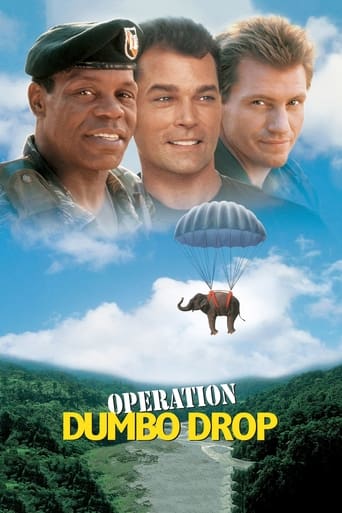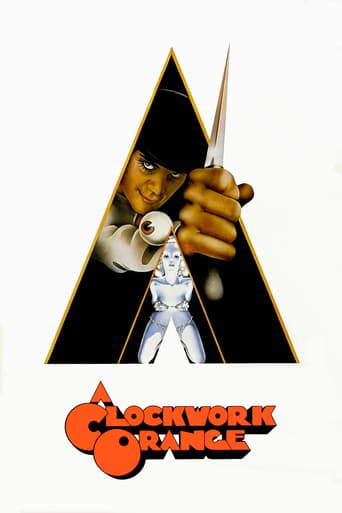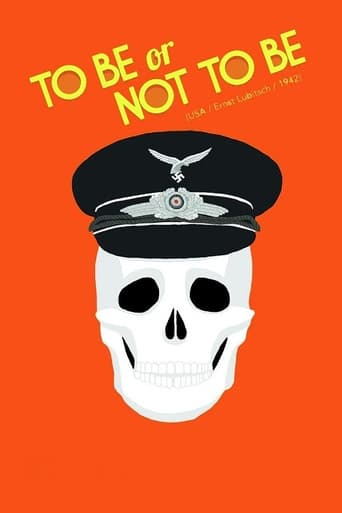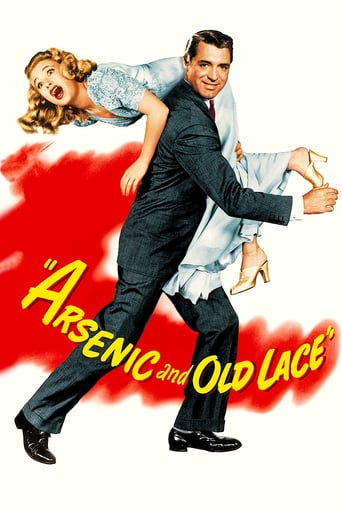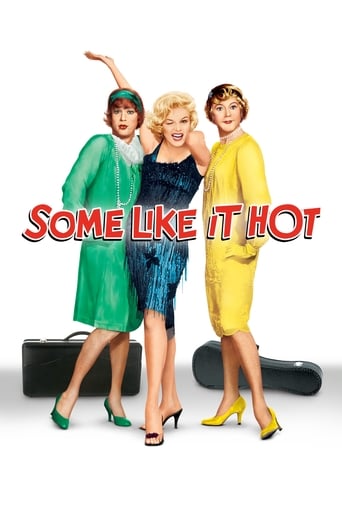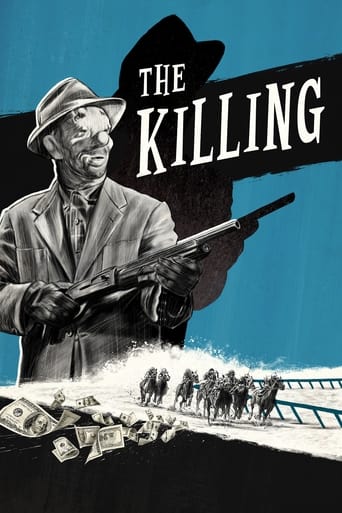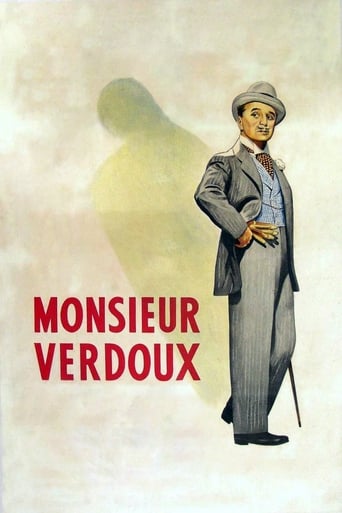
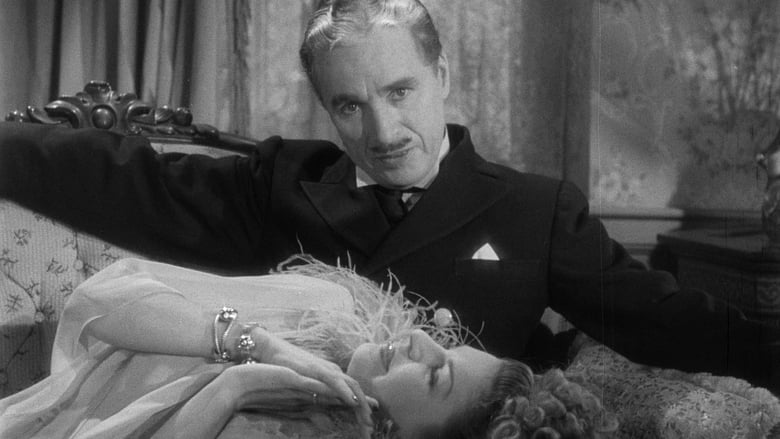
Monsieur Verdoux (1947)
The film is about an unemployed banker, Henri Verdoux, and his sociopathic methods of attaining income. While being both loyal and competent in his work, Verdoux has been laid-off. To make money for his wife and child, he marries wealthy widows and then murders them. His crime spree eventually works against him when two particular widows break his normal routine.
Watch Trailer
Cast


Similar titles
Reviews
It took me years to settle down, mature, and approach this film with a fresh eye. Those looking for the little fellow to knock about and make them howl with laughter, are approaching this gem from the wrong direction. I know, because that's what *I* have done. After several years of relishing Chaplin's work up through "Modern Times", I found this film, (and The Great Dictator), hard to approach. Decades had to go by, before I could have a screening, which was worthy of its genius. I PROPOSE AN EXPERIMENT: Can movie fans like me round up some new viewers, who know nothing of Chaplin, and get their take on this without the pre-loaded expectations of The Gentleman Tramp? Best bits for me come in all sequences with Martha Raye ("THE MOUTH"), and a profound sequence inside a flower shop, where Verdoux sweet-talks a woman over the telephone. Watch the reaction of the florist listening- in. The scene is sublime and devastating. his first murder is artfully portrayed by letting us watch the outdoors, through a window, across a stairway going up. The bedroom in which the crime occurs is off to the left. Brilliant economy and unforgettable story-telling.
When Chaplin walked, the world stood and took notice of his distinct walk, when he cried, the world smiled, now in this Film Chaplin spoke some serious stuff, and the world though rejected him first, later applauded him. Monsieur Verdoux is a black comedy film that has an undercurrent satire put in a drama. As the poster rightly says, Chaplin has changed from the well known Tramp to a serial killer, who kills married widows for business. Also, his name seems to have changed from Charlie Chaplin to Charles Chaplin. He made this film in Paris unlike many of his earlier American films.This film is about how he immaculately murders and still escapes the ordeal for the better of the film is what makes it thrilling.The dialogs are those that shall be remembered long after the film is over. The lines like "Despair is a narcotic. It lulls the mind into indifference". "Wars, conflict - it's all business. One murder makes a villain; millions, a hero. Numbers sanctify, my good fellow!"Wow, such wonderful lines from a genius Charles Chaplin. This film is full of such surprises that I better not reveal here. It's worth the time we watch. Just leave out the prejudices you have of Chaplin and see it as a film, then I can assure you more often than not you will be enjoying it.The music without showing us anything, speaks so much. The one scene where Chaplin goes inside and the night becomes day and in the backdrop we have a loud suspenseful music scores that gives us a sense of what happened inside the room. Wow, this Chaplin was some kind of a man, and for this scene, he would have taken a cue from the great Hitchcock who does use such things. Now, the idea of the film itself was given by another genius called Orson Welles and what an idea this is, making murders as business, And how well it was interpreted by Chaplin should be taken a note. Now, of all the films we know of Chaplin, we can identify him to the Tramp so much that to make him a murderer in this seems to be a sin. Yet, Chaplin convinces us in the climax providing us not just with a reason of his act, but also a reason for the very existence of most. A 4/5 would be just apt I believe. Thanks Chaplin once again. I am happy to have seen the movie now.
An unemployed man supports his family by marrying and murdering rich women for their money. Chaplin made only a handful of films after the silent era and this one followed "The Great Dictator" after a seven-year gap, a period over which the great comedian seems to have lost his gift for laughs. Perhaps this was just the result of Chaplin in his autumnal years wanting to do something more substantial, but he seems unsure of whether he's doing comedy or drama. This is the first film in which Chaplin speaks English, but he hardly says anything that is funny. After a slow start, this turns out to be a decent film but it seems the premise had potential for much more humor than is mined here.
I suppose the only thing one has any right to expect from a Chaplin movie is the unexpected. If that's what you're looking for, Monsieur Verdoux won't disappoint you.Still, I have to confess that it disappointed me. There is none of the genius that makes his previous movie, The Great Dictator, one of the marvels of movie history. Most of this is just the mildly amusing story of a man who loses his job in a bank and so, to support his invalid wife and child, marries a series of foolish wealthy women and then kills them off for their money. It never considers the question of whether those marriages are consummated or not, whether he is therefore being physically unfaithful to his invalid wife, etc. In one scene we learn that he sleeps in the same room with one of his wealthy conquests, but that's it.Near the end, the political world starts to intrude more and more into this otherwise anodyne story, usually through newspaper headlines. We see that Europe is arming for another world war, that the Fascists kill innocent women and children in Spain, etc., while the plot meanders on.Then, finally, when the police start to catch up with Verdoux, he begins to give speeches about the mass killings in Europe, as if out of the blue. He suddenly has the voice we heard in The Great Dictator, but this time it comes out of nowhere, and it seems much less convincing. Is this really why Chaplin told a story of a man who poisoned wealthy widows, as a way of condemning European armament? In 1940's The Great Dictator such words had the terrible sound of foreboding prophesy. Several years after the war (1947), with no new war criminals portrayed after Hitler and Mussolini, this seems, basically, old news.I recognize Chaplin's genius, and wish I could talk about examples of it in his movie, but I really didn't see any. More's the shame.


